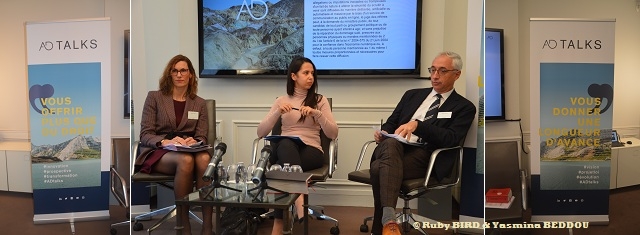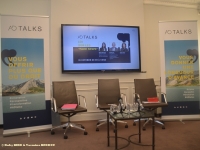Vips
AD TALKS (Debate) On The NEW FRENCH BILL ON FAKE NEWS
At AUGUST DEBOUZY In PARIS

Amélie TRIPET, Naïma MOUTCHOU & Basile ADER (Source: © Ruby BIRD & Yasmina BEDDOU)
USPA NEWS -
AUGUSTE DEBOUZY, a French Law Firm offering Legal Advice with its 150 Lawyers was organizing a debate called AD TALK at their Office in Paris, on October 29, 2018. The Theme of that Event was "Bill on Fake News" and had as Speakers :
* Naïma MOUTCHOU - Député du Val d'Oise , Rapporteur de la loi sur la lutte contre les Fake News (Speaker for the Project of Bill on fake News)
* Basile ADER - Avocat Associé (Associate Lawyer), Vice-Bâtonnier de l´Ordre des Avocats de Paris, directeur de la rédaction de Légipresse (Managing Editor of Légipresse)
* Amélie TRIPET - Counsel
* Naïma MOUTCHOU - Député du Val d'Oise , Rapporteur de la loi sur la lutte contre les Fake News (Speaker for the Project of Bill on fake News)
* Basile ADER - Avocat Associé (Associate Lawyer), Vice-Bâtonnier de l´Ordre des Avocats de Paris, directeur de la rédaction de Légipresse (Managing Editor of Légipresse)
* Amélie TRIPET - Counsel
AUGUSTE DEBOUZY, a French Law Firm offering Legal Advice with its 150 Lawyers was organizing a Debate called AD TALK at their Office in Paris, on October 29, 2018. The Theme of that Event was "Bill on Fake News" and had as Speakers :
* Naïma MOUTCHOU - Député du Val d'Oise , Rapporteur de la loi sur la lutte contre les Fake News (Speaker for the Project of Bill on fake News)
* Basile ADER - Avocat Associé (Associate Lawyer), Vice-Bâtonnier de l´Ordre des Avocats de Paris, directeur de la rédaction de Légipresse (Managing Editor of Légipresse)
* Amélie TRIPET - Counsel
* Naïma MOUTCHOU - Député du Val d'Oise , Rapporteur de la loi sur la lutte contre les Fake News (Speaker for the Project of Bill on fake News)
* Basile ADER - Avocat Associé (Associate Lawyer), Vice-Bâtonnier de l´Ordre des Avocats de Paris, directeur de la rédaction de Légipresse (Managing Editor of Légipresse)
* Amélie TRIPET - Counsel
The State wants to make the Digital Platforms accountable and also to "eradicate" Fake News during the Elections. This Project of Bill currently discussed at the Parliament is creating a New Summary Proceedings against "Fake News", the Obligation to "designate a Reference" inside the Platform and the measures undertaken to "educate" the Youth to "decrypt" infos. This Debate is about to discuss the feasability of this New Device and the Consequences on Freedom Of Speech. Would it be an Approach to encourage Operators Online to "Better Control" the Broadcasted Contents ?
As France debates Fake News Bill, Critics see Threat to Free Speech. French President Emmanuel Macron signaled earlier this Year that Action would be taken to limit the Spread of Fake News. However, Critics say the Proposed Laws threaten Freedom of Expression and could give the Government Undue Control Over Information. Deputies in the National Assembly are considering Two Proposals put forward by Emmanuel Macron's Party, La "République En Marche", one applying to Any Election and the other specifically to Presidential Elections.
The Law, which if passed would allow French Authorities to stop the Publication of Information determined to be False before an Election. It would require Social Networks to crack down on Fake News and provide Ways for Users to flag False Information and notify Authorities. The Law would also allow the Government to block Foreign Broadcasters if they "aim" to destabilize the French Government, a Measure likely targeting RT, a Russian Global News Channel funded by the Kremlin, which was accused of "promoting Fake News" during the Run-Up to Last Year's French Election.
FAKE NEWS is a Type of Yellow Journalism or Propaganda that consists of Deliberate Disinformation or Hoaxes spread via Traditional Print and Broadcast News Media or Online Social Media. The Term is also at Times used to cast Doubt upon Legitimate News from an Opposing Political Standpoint, a Tactic known as the Lying Press. Fake News is written and published with the intent to mislead in order to damage an Agency, Entity, or Person, and/or gain Financially or Politically, often using Sensationalist, Dishonest, or Outright Fabricated Headlines to increase Readership, Online Sharing, and Internet Click Revenue. Intentionally Misleading and Deceptive Fake News differs from Obvious Satire or Parody, which is intended to amuse rather than mislead its Audience. The Relevance of Fake News has increased in Post-Truth Politics.
But the fact that Fake News is Free Speech does not nullify the Danger it poses for Open Discourse, Freedom of Opinion, or Democratic Governance. The Rise of Fraudulent News and the Related Erosion of Public Trust in Mainstream Journalism pose a Looming Crisis for Free Expression. Usually, Free Expression Advocacy centers on the Defense of Contested Speech from Efforts at Suppression, but it also demands Steps to fortify the Open and Reasoned Debate that underpins the Value of Free Speech in our Society and our Lives. The Championing of Free Speech must not privilege any Immutable Notion of the Truth to the Exclusion of Others. But this doesn´t mean that Free Speech Proponents should be Indifferent to the Quest for Truth, or to attempts to deliberately undermine the Public´s Ability to distinguish Fact from Falsehood....
The Debate over Solutions to Fraudulent News has centered on what the Government, News Outlets, Social Media Platforms, and Civil Society Actors like Fact-Checking Groups can do. Each has an Important Role to play, but they also must respect Sharp Limits to their Interventions.
Source : Debate AD TALKS @ August Debouzy Office in Paris - October 29, 2018
Ruby BIRD
http://www.portfolio.uspa24.com/
Yasmina BEDDOU
http://www.yasmina-beddou.uspa24.com/
Source : Debate AD TALKS @ August Debouzy Office in Paris - October 29, 2018
Ruby BIRD
http://www.portfolio.uspa24.com/
Yasmina BEDDOU
http://www.yasmina-beddou.uspa24.com/
Amelie Tripet Basile Ader Naima Moutchou Platform Media Politicians Law Fake News Ad Talks Yasmina Beddouauguste Debouzy Ruby Bird
Liability for this article lies with the author, who also holds the copyright. Editorial content from USPA may be quoted on other websites as long as the quote comprises no more than 5% of the entire text, is marked as such and the source is named (via hyperlink).






